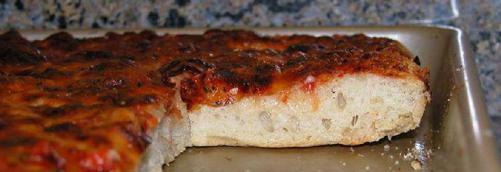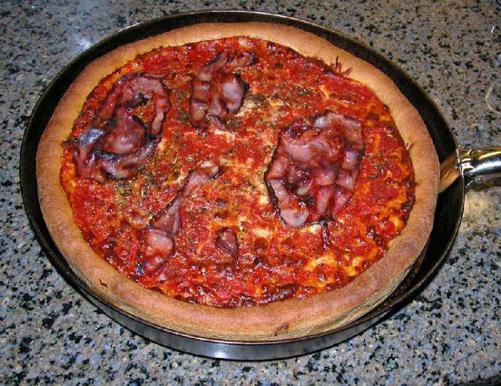Passionate About Pizza: Making Great Homemade Pizza (36 page)
Read Passionate About Pizza: Making Great Homemade Pizza Online
Authors: Curtis Ide
Tags: #Baking, #Cookbook, #Dough, #Pizza

Pressing Dough Into Shape
– Place the rested dough into the oiled pan. Cover your fingers and palms with a light coating of oil to keep your hands from sticking to the dough. Press the dough flat with your palms to start shaping it and to release any big bubbles. Press and push the dough to the edges and sides taking care to keep the dough even across the whole surface of the pan. If the dough pulls back away from the edges of the pan keep stretching a little further until it fits the pan. You will probably have to pull the corners of the dough several times to stretch them enough so they stay in place in the corners of the pan. You have finished shaping when the dough stays in place covering the whole pan.

Cover the pan with waxed paper and place it in a warm, draft-free place to rise. Let it rise for between ten and thirty minutes. The longer you let the dough rise the thicker the crust will be when you bake the pizza. If you want thinner pizza, you can cut the rising time shorter. You can even bake the pizza immediately after shaping (the crust will rise some in the oven while the pizza bakes, anyway).
Using the tips of your fingers, dimple the entire surface of the dough to connect top and bottom crust to keep the crust from over-rising.

Assembly
– Using your fingertips, make small indentations (about a quarter inch deep) in the dough over the entire surface at about one inch intervals. Be careful not to press too deeply into the dough. If the corners have receded, you can gently pick up the corner and stretch it slightly to better fit the pan. If you want, you can lightly brush the top surface of the shaped pizza dough with olive oil all the way to the edge. You can use a pastry brush or your fingers. Spread an even layer of sauce over the pizza shell to the inside edge of the rim. Sprinkle the Mozzarella cheese evenly over the sauce then sprinkle with a small amount of herbs and Romano cheese, if desired. The sauce and toppings will have a tendency to migrate toward the center, so you should put a little less in the center; otherwise, the cooked pizza will be soggy in the center.
Baking
– Place the pizza pan in the oven on the lowest rack. Bake at 400 degrees Fahrenheit for ten minutes. Move the pizza pan to the middle rack and continue baking. Bake for an additional ten to twenty minutes. The instructions list a range of time because the temperature of different ovens can vary.
You want to bake the pizza until the crust is nicely browned and crispy on top as well as on the bottom (inside the pan), but not overdone. The toppings heat through; the cheese should be bubbling slightly over the entire surface of the pizza. This ensures that the toppings and sauce have reached the right temperature. In addition, the cheese should brown darkly on its surface over much or all of the pizza; this gives it a nice hearty taste. Just keep an eye on the cheese and the edges of the pizza to ensure that it does not burn.
Serving
– After removing the pizza from the oven, let it stand for a few minutes on a trivet until the sauce stops bubbling and the pizza cools slightly. This allows the toppings and cheese to set prior to cutting. Cut the pizza into manageable size squares and serve while still warm.
This pizza also tastes great when served cold. You can let the pizza cool to room temperature then refrigerate it to be served up to two or three days later.
Variations
Dough
– 1 1/2 batch Basic Dough, Cornmeal Dough, 1 1/2 batch Focaccia Dough, 1 1/2 batch Half Wheat Dough, Potato Dough, 1 1/2 batch Rye Dough, 1 1/2 batch Slow Rise Dough
Sauce
– Basic Pizza Sauce, Chicago-style Sauce, Fresh Plum Tomato Sauce, Mexican Chile Sauce, Sassy South of the Border Sauce, Squashed Tomato Sauce
Toppings
– Virtually any edible cheese, vegetable, fruit, or meat.
Assembly and Baking
– Sicilian-style pizza made in a pizza pan rises before assembly; if you do not do that, you are not making Sicilian-style Pizza. Nevertheless, do not let that stop you from doing things the way that you want to!

Chicago-style Pizza

Chicago-style Pizza is thick-crust pan pizza with a definite mid-western flair to it. Sausage and spinach are two favorite pizza toppings in Chicago. If you put pepperoni on it, you are probably from out of town!
What distinguishes Chicago-style pizza from other styles of pizza? The pizza bakes in special pans. These are heavy steel pans about fourteen inches in diameter and an inch deep. In a Chicago-style Pizzeria, they will be black and crusted over from heavy use. The dough is special, too. It is thick because it rises in the pan before baking and it generally has cornmeal in it for a slightly different taste. The pizza assembly is different, as well. The chef puts the cheese on the bottom of the pizza right on top of the dough, then puts the super-tangy tomato sauce on top, and puts a large quantity (sometimes up to a full pound) of topping ingredients in between. The whole package is extremely hearty and filling.
Deep Dish Pan Pizza
Makes one fourteen inch pizza.
1 recipe Cornmeal Dough (see recipe
page 96
)
olive oil (or butter)
1 pound Mozzarella cheese, thinly sliced or grated
1/2 – 1 pound sliced Italian sausage (cooked), pancetta, or prosciutto
1 recipe Chicago-style Sauce (see recipe
page 114
)
Italian herbs
Romano cheese
unbleached all-purpose flour (for kneading and shaping)
Resting
–
After the dough has risen, punch it down with one fist, take it out of the bowl, and knead it briefly (about one minute) without adding any flour, to release the large air bubbles. Make a dough ball then shape it into a flat circle about one inch thick. Spread a substantial coat of olive oil (or butter) over the entire inside surface of the Chicago-style pizza pan. Place the dough in the center of the oiled pan. Cover the dough lightly with a kitchen towel and let it rest for five to ten minutes (up to a maximum of twenty minutes) before shaping it.
Shaping
– You shape Chicago-style Pizzas by pressing the dough into the pizza pan. Use the technique described in the Pressing Pizza Dough Into Shape in the preparation techniques chapter (see
page 59
).


Let the dough rise in the pan to create very thick crust. After you press the dough into shape, cover the pan with a kitchen towel and place it in a warm, draft-free place to rise. You can let it rise for ten to twenty minutes. Actually, it is not necessary to let the dough rise in the pan. The dough will rise a little in the oven, anyway. Because of this, I typically do not let it rise in the pan.
Go ahead and let the dough rise in the pan longer if you want the dough to be thicker after you bake the pizza. If you prefer thinner crust then shape the pizza, assemble it without letting it rise in the pan, and then bake it.
